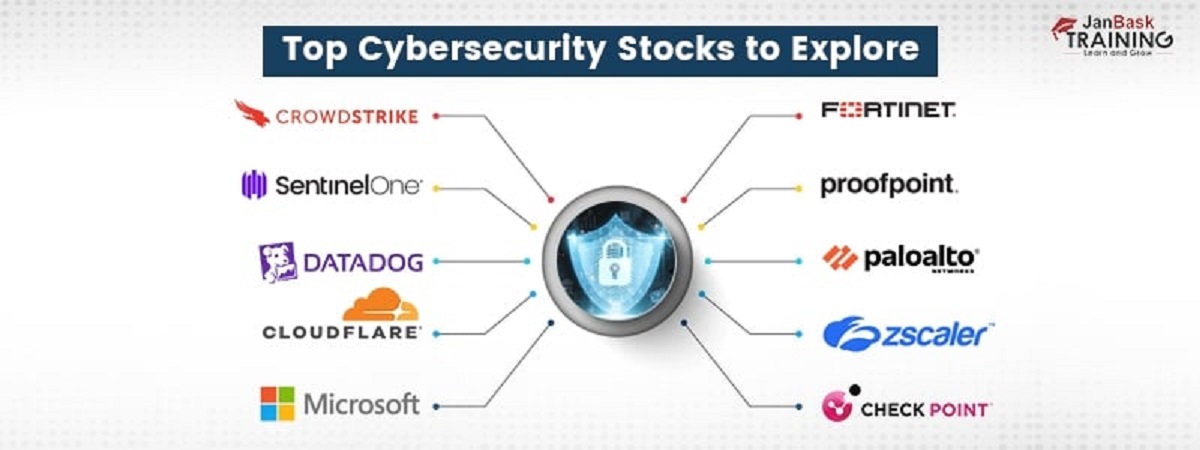Introduction
With the increase in cyber threats and the growing importance of online security, the demand for cybersecurity solutions is skyrocketing. As technology evolves, so do the methods employed by hackers, making it crucial for organizations and individuals to invest in robust cybersecurity measures. As a result, the cybersecurity industry has experienced significant growth, making it an attractive investment opportunity for individuals looking to capitalize on this trend.
Investing in cybersecurity stocks can be a lucrative way to take advantage of this rapidly expanding market. These stocks represent companies that provide products and services aimed at protecting individuals, businesses, and governments from cyber threats such as data breaches, malware attacks, and identity theft. While investing in any sector comes with risks, the cybersecurity industry is positioned for long-term growth due to the constant need for cybersecurity solutions in our increasingly digital world.
This article will provide an overview of key factors to consider when investing in cybersecurity stocks, highlight some of the top cybersecurity companies to invest in, discuss online brokerages and exchange-traded funds (ETFs) for investing in this sector, explore the best cybersecurity stocks for long-term growth, and address potential risks and challenges associated with investing in this industry.
It is important to note that investing in cybersecurity stocks carries risks, and past performance is not indicative of future results. This article aims to provide general information and should not be considered financial advice. Before making any investment decisions, it is advisable to conduct thorough research and consult with a qualified financial advisor.
Key Factors to Consider When Investing in Cybersecurity Stocks
When considering investments in cybersecurity stocks, it is crucial to evaluate various factors that can affect their performance and profitability. Here are some key factors to consider:
- Market Demand: Assess the current and future demand for cybersecurity solutions. Look for companies that offer innovative and comprehensive products and services that address the evolving threats in the cyber landscape.
- Competitive Advantage: Examine the competitive landscape and identify companies with a strong market position and a sustainable advantage over their competitors. This can be in the form of patented technologies, strategic partnerships, or strong brand recognition.
- Financial Performance: Analyze the financial health of a cybersecurity company by reviewing its revenue growth, profitability, and cash flow. Look for companies with consistent and sustainable growth metrics.
- Research and Development: Evaluate the company’s commitment to research and development (R&D), as this is crucial for staying ahead of emerging threats and developing cutting-edge cybersecurity solutions.
- Customer Base: Consider the breadth and diversity of a company’s customer base. Look for companies that serve a wide range of industries and have strong long-term relationships with their clients.
- Regulatory Environment: Stay informed about the regulatory environment governing the cybersecurity industry. Changes in regulations regarding data privacy or security can significantly impact the operations and profitability of cybersecurity companies.
By considering these key factors, you can make informed investment decisions and identify cybersecurity stocks that have the potential for long-term growth and profitability. Remember that investing involves risks, and it is essential to diversify your portfolio and consult with a financial advisor before making any investment decisions.
Top Cybersecurity Companies to Invest in
The cybersecurity industry is highly competitive, and there are several companies that have established themselves as leaders in this space. Here are some of the top cybersecurity companies that investors should consider:
- Cisco Systems, Inc. (CSCO): Cisco is a multinational technology conglomerate that offers a range of cybersecurity solutions, including network security, cloud security, and endpoint security. With a strong market presence and a robust product portfolio, Cisco is well-positioned to capitalize on the increasing demand for cybersecurity services.
- Palo Alto Networks, Inc. (PANW): Palo Alto Networks is a leading provider of next-generation cybersecurity solutions. Their offerings include firewalls, advanced threat detection, and cloud security services. The company has a reputation for innovation and has consistently demonstrated strong financial performance.
- CrowdStrike Holdings, Inc. (CRWD): CrowdStrike is a cloud-based cybersecurity company known for its endpoint protection platform. Its solutions leverage artificial intelligence and machine learning algorithms to detect and respond to cyber threats in real-time. The company has experienced rapid growth and has a significant market share in the endpoint security market.
- Symantec Corporation: Symantec is a well-established cybersecurity company known for its antivirus software and endpoint protection solutions. The company offers a wide range of cybersecurity products and services for individuals and businesses. Symantec has a strong brand presence and a loyal customer base.
- Fortinet, Inc. (FTNT): Fortinet is a global leader in cybersecurity solutions, specializing in network security and unified threat management. The company’s comprehensive suite of products includes firewalls, secure email gateways, and secure access solutions. Fortinet has a strong customer base and a global presence.
These are just a few examples of the top cybersecurity companies in the market. It is essential to conduct thorough research and consider factors such as market position, financial performance, product innovation, and competitive advantage before making any investment decisions. Additionally, keep in mind that the performance of these companies can be influenced by various market factors, and past performance is not indicative of future results.
Online Brokerages for Investing in Cybersecurity Stocks
Investing in cybersecurity stocks is now more accessible than ever, thanks to the rise of online brokerages. These platforms offer individuals the opportunity to buy and sell stocks from the comfort of their own homes. Here are some popular online brokerages that provide access to cybersecurity stocks:
- E*TRADE: E*TRADE is a well-established online brokerage that offers a user-friendly trading platform. It provides access to a wide range of stocks, including cybersecurity companies. E*TRADE also provides research tools and educational resources to help investors make informed decisions.
- TD Ameritrade: TD Ameritrade is another prominent online brokerage that offers a robust platform for trading cybersecurity stocks. It provides access to an extensive list of investment options and offers educational resources to help investors understand the market.
- Fidelity Investments: Fidelity is a reputable online brokerage that offers a range of investment options, including cybersecurity stocks. It provides a user-friendly platform, research tools, and educational resources to assist investors in their decision-making process.
- Charles Schwab: Charles Schwab is a popular online brokerage that offers a range of investment services. It provides a comprehensive trading platform, research tools, and access to cybersecurity stocks. It is known for its low-cost trades and excellent customer service.
- Robinhood: Robinhood is a commission-free online brokerage that has gained popularity in recent years. While it may have a more limited list of available stocks, it offers a user-friendly interface and easy accessibility for novice investors.
These are just a few examples of online brokerages that offer access to cybersecurity stocks. It is important to evaluate each platform’s fees, trading tools, customer service, and available resources to determine which one aligns best with your investing goals and preferences. Additionally, consider factors such as account minimums and additional features offered by these brokerages.
Before investing, ensure that you understand the risks involved in trading stocks and conduct thorough research on the cybersecurity companies you plan to invest in. It is also advisable to consult with a financial advisor who can provide guidance tailored to your specific financial situation and risk tolerance.
Exchange-Traded Funds (ETFs) for Investing in Cybersecurity Stocks
Investing in individual cybersecurity stocks may not be suitable for everyone. For those looking for a more diversified approach, exchange-traded funds (ETFs) provide an excellent alternative. ETFs are investment funds that trade on stock exchanges, and they offer exposure to a basket of securities, including cybersecurity stocks. Here are some popular ETFs that focus on the cybersecurity industry:
- Cybersecurity ETF (HACK): HACK is one of the most well-known ETFs in the cybersecurity space. It tracks the performance of the Prime Cyber Defense Index, which includes companies engaged in cyber defense technologies and services. This ETF provides investors with broad exposure to the cybersecurity industry.
- First Trust NASDAQ Cybersecurity ETF (CIBR): CIBR tracks the performance of the Nasdaq CTA Cybersecurity Index. It invests in companies that are actively involved in providing cybersecurity technology and services. This ETF includes both domestic and international cybersecurity companies.
- iShares Cybersecurity and Tech ETF (IHAK): IHAK aims to track the performance of the NYSE FactSet Global Cyber Security Index. It provides exposure to global companies involved in cybersecurity and technology. This ETF includes companies from various sectors such as software, hardware, and consulting services.
- Global X Cybersecurity ETF (BUG): BUG seeks to track the performance of the Indxx Cybersecurity Index. It invests in companies across the globe that are actively involved in cybersecurity. This ETF includes a mix of large, mid, and small-cap stocks in the cybersecurity industry.
- ALPS ETF Trust – ALPS Disruptive Technologies ETF (DTEC): While not solely focused on cybersecurity, DTEC invests in disruptive technology companies, including cybersecurity firms. It provides exposure to various innovative sectors, including artificial intelligence, cloud computing, and cybersecurity.
Investing in cybersecurity ETFs allows individuals to gain exposure to a diversified portfolio of cybersecurity stocks, mitigating some of the risks associated with investing in individual companies. These ETFs provide an opportunity to participate in the growth of the cybersecurity industry as a whole.
As with any investment, it is important to carefully review the objectives, holdings, and expense ratios of each ETF before making an investment decision. Consider your investment goals, risk tolerance, and time horizon when choosing which cybersecurity ETF is right for you.
It is advisable to conduct thorough research and consult with a financial advisor to ensure that the chosen ETF aligns with your investment strategy and financial objectives.
Best Cybersecurity Stocks for Long-term Growth
When considering cybersecurity stocks for long-term growth, it is important to focus on companies that exhibit strong fundamentals, innovative solutions, and a track record of success. While past performance is not indicative of future results, here are some of the top cybersecurity stocks that have shown promising potential:
- CrowdStrike Holdings, Inc. (CRWD): CrowdStrike is a leader in cloud-based endpoint security. The company has experienced rapid revenue growth and has a strong customer base. Its innovative technology powered by artificial intelligence and machine learning capabilities positions it well for future growth.
- Cisco Systems, Inc. (CSCO): Cisco offers a comprehensive suite of cybersecurity solutions, including network security, cloud security, and endpoint security. The company has a strong market presence, a solid financial track record, and a commitment to research and development, all of which contribute to its long-term growth potential.
- Palo Alto Networks, Inc. (PANW): Palo Alto Networks is recognized as a leading provider of next-generation cybersecurity solutions. The company’s advanced firewall technology and cloud-based security services have positioned it as a key player in the industry. With a focus on innovation and strong financial performance, Palo Alto Networks is expected to continue its growth trajectory.
- Fortinet, Inc. (FTNT): Fortinet specializes in network security and unified threat management solutions. The company has a wide range of cybersecurity offerings and a global customer base. With a strong emphasis on research and development and a solid financial standing, Fortinet is well-positioned for long-term growth in the cybersecurity market.
- CyberArk Software Ltd. (CYBR): CyberArk is a leading provider of privileged access management solutions. The company’s technology helps organizations protect their most critical assets from cyber threats. With a focus on innovation and a growing customer base, CyberArk offers compelling long-term growth potential in the cybersecurity industry.
While these stocks show promise for long-term growth, it is essential to conduct thorough research and consider your own investment goals and risk tolerance. Investing in individual stocks carries inherent risks, and it is important to diversify your portfolio and consult with a financial advisor before making any investment decisions.
Additionally, keep in mind that the cybersecurity industry is ever-evolving, and new companies and technologies may emerge. Staying informed about market trends and industry advancements can help investors identify potential long-term growth opportunities.
Potential Risks and Challenges in Investing in Cybersecurity Stocks
While investing in cybersecurity stocks can offer significant growth potential, it is important to be aware of the risks and challenges associated with this sector. Here are some potential risks and challenges to consider:
- Competition and Market Consolidation: The cybersecurity industry is highly competitive, with numerous companies vying for market share. Intense competition can drive down prices and decrease profit margins. Additionally, the industry has seen a trend towards consolidation, which could limit investment opportunities or pose risks to smaller companies.
- Technological Advancements: The rapid pace of technological advancements brings both opportunities and challenges to the cybersecurity industry. As cyber threats continue to evolve, companies must continually invest in research and development to stay ahead. Failure to adapt to new technologies and threats could impact a company’s market position and profitability.
- Regulatory and Compliance Risks: The cybersecurity industry operates within a complex regulatory landscape. Changes in laws and regulations related to data privacy and security can impact the operations and profitability of cybersecurity companies. Compliance with evolving requirements can be a challenge for companies, especially smaller ones with limited resources.
- Cybersecurity Breaches: Despite being in the business of protecting against cyber threats, cybersecurity companies themselves are not immune to breaches. A significant cybersecurity breach can not only result in financial losses but also damage a company’s reputation and erode trust among customers and investors.
- Dependency on Government Spending: Cybersecurity companies often rely on government contracts, as governments invest heavily in protecting their infrastructure and data. Changes in government spending priorities or budget cuts can impact revenue streams for cybersecurity firms, particularly those heavily reliant on government contracts.
- Global Economic Conditions: Like any industry, the cybersecurity sector is influenced by broader economic conditions. During times of economic downturn, companies may cut back on their cybersecurity spending, impacting the revenue and growth potential of cybersecurity firms.
It is important to carefully assess these risks and challenges before investing in cybersecurity stocks. Diversification, thorough research, and a deep understanding of individual companies’ strengths and weaknesses can help mitigate some of these risks. Additionally, staying informed about industry trends and maintaining a long-term investment perspective can position investors for success in the cybersecurity sector.
Remember that investing in individual stocks carries inherent risks, and it is advisable to consult with a qualified financial advisor who can provide personalized guidance based on your financial goals and risk tolerance.
Conclusion
Investing in cybersecurity stocks can be an excellent opportunity for individuals looking to capitalize on the increasing demand for cybersecurity solutions. The industry’s growth prospects, driven by the constant need for protection against evolving cyber threats, make it an attractive investment option.
When considering investments in cybersecurity stocks, it is crucial to evaluate key factors such as market demand, competitive advantage, financial performance, research and development efforts, customer base, and the regulatory environment. By carefully assessing these factors, investors can identify companies that demonstrate strong potential for long-term growth.
Furthermore, individuals have the option to invest in cybersecurity stocks through online brokerages, which provide convenient access to the market. Alternatively, exchange-traded funds (ETFs) offer a more diversified approach by providing exposure to a basket of cybersecurity stocks.
However, it is important to acknowledge the potential risks and challenges associated with investing in cybersecurity stocks. These risks include competition, technological advancements, regulatory and compliance factors, cybersecurity breaches, dependency on government spending, and the impact of global economic conditions. By carefully considering these risks, investors can make informed investment decisions and develop strategies to mitigate potential downsides.
In conclusion, investing in cybersecurity stocks requires thorough research, an understanding of market dynamics, and consideration of individual risk tolerance. It is essential to diversify investments, consult with a financial advisor, and stay informed about industry trends to make informed decisions.
Remember that investing involves risks, and past performance is not indicative of future results. As the cybersecurity landscape continues to evolve, investing in this sector can offer promising opportunities, but it is important to approach it with a long-term perspective and a well-rounded investment strategy.

























